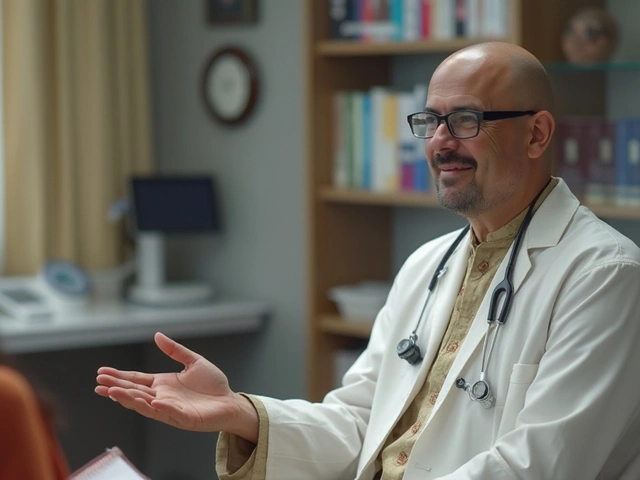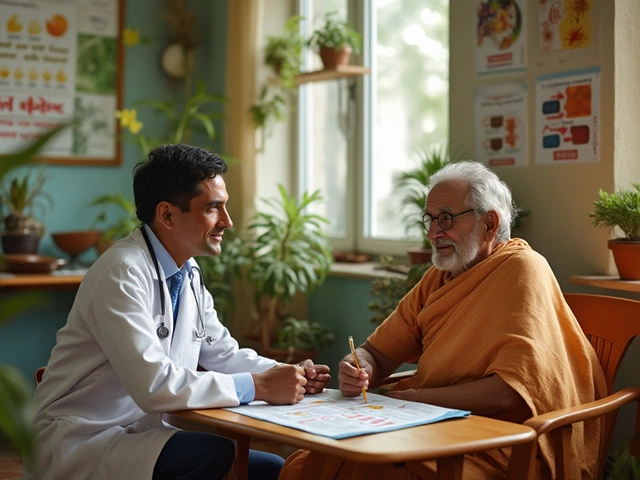
So, you’re thinking about hopping on a plane to fix that aching tooth or maybe change up your look a bit? Well, you're not alone. Medical tourism is a booming trend. Imagine blending a vacation with a doctor's visit and saving some cash along the way. Sounds tempting, right?
Medical tourism involves people traveling to another country for healthcare. It might sound a bit wild at first, but there's a method to the madness. People from countries with super expensive healthcare find it cheaper—even after paying for flights and hotels—to get treated elsewhere. It’s not just about saving money; it can also mean quicker access to treatments that have long waiting lists back home.
Places like Thailand, India, and Costa Rica are pretty popular for such medical getaways. They offer everything from dental care to cosmetic surgeries, and yes, you can enjoy the beaches at the same time. But, remember, not everything is a walk in the park. There's a flip side with risks involved, like quality of care and recovery away from home. Planning is your best friend here. Do solid research before packing your bags to make sure your trip is as safe and effective as possible.
- The Basics of Medical Tourism
- Popular Destinations
- Cost Savings and Benefits
- Potential Risks and Challenges
- Planning Your Medical Trip
- Real-life Experiences
The Basics of Medical Tourism
Alright, let's dive into medical tourism and see what's cooking. At its core, medical tourism is when folks travel to other countries to get healthcare services. This could be anything from a simple dental procedure to complex surgeries. But what's driving people to pack their bags and seek treatment far from home?
The main reason is cost. Some countries offer the same medical services at a fraction of the price compared to places like the US or Western Europe. It's not just about the price tag though. Wait times can be ridiculous back home, and flying abroad can mean getting treated much sooner. Plus, healthcare systems in countries like India and Mexico often have top-notch facilities and skilled professionals.
Here's an interesting nugget—did you know that nearly two million Americans travel abroad each year just for healthcare? And it's not just the Americans. People from all over the world are jumping on this trend.
Many seek treatment in countries known for specific medical specialties. For instance, Thailand is famous for its cosmetic surgery, while India is a hub for complex cardiac and orthopedic surgeries. Each of these countries has its set of accredited facilities and English-speaking staff, making travelers more comfortable.
But, as chill as this sounds, it's not without its headaches. You could face challenges like language barriers, differences in healthcare standards, or insurance hiccups. That's why it's a big deal to research before taking the plunge.
What's essential here? Plan smartly, verify your chosen facility's accreditation, and talk to your regular doc about your plans. This way, you'll ensure your medical tourism experience is as smooth and beneficial as possible.
Popular Destinations
If you're considering medical tourism, picking the right destination is a big deal. You want to balance quality healthcare with a place you'd enjoy visiting. So, where are folks heading?
Thailand is high on the list. Known for affordable yet top-notch medical facilities, it attracts people for everything from dental work to heart surgeries. Plus, you can't ignore the bonus of stunning beaches and rich culture.
Then there's India, famous for its skilled doctors and cutting-edge technology, especially in complex procedures like joint replacements and heart surgeries. You also get the chance to dive into its fascinating heritage and cuisine.
Don't forget about Costa Rica. It's grabbing attention for affordable dental and cosmetic surgeries. But, as a cherry on top, it's a paradise for nature lovers with its rainforests and beaches.
For those in Europe, Hungary is a go-to for dental procedures. Many travelers praise the quality care at prices way below what they’d pay back home. Plus, exploring Budapest is something you might not want to miss.
And let's chat about Mexico. It’s a convenient choice for folks from the US, offering everything from weight loss surgeries to cosmetic procedures. With its convenience and vibrant towns, it's no wonder it's a favorite.
So, whether you're thinking about a serious surgery or a quick cosmetic fix, these destinations each add their flair to the mix. Plan wisely, and wherever you go, make sure your health—and a little adventure—comes first.
Cost Savings and Benefits
When we talk about medical tourism, the cost savings are usually the biggest draw for folks. Imagine getting a procedure for 50% less than what you’d pay back home – sounds pretty sweet, right? That’s the reality for many people traveling for healthcare. And it’s not just about the money.
First off, let’s consider some numbers. In countries like the United States, you might shell out $50,000 for a hip replacement. But in places like India or Thailand, you could pay just around $10,000 including travel expenses. That’s a serious chunk of change staying in your pocket.
| Procedure | Cost in USA | Cost in India | Cost in Thailand |
|---|---|---|---|
| Hip Replacement | $50,000 | $7,000 | $15,000 |
| Heart Bypass | $123,000 | $7,900 | $15,000 |
| Dental Implants | $3,900 per tooth | $1,000 | $2,000 |
But it's not just about cheap prices. You’re also getting access to treatments that might have long wait times in your own country. Think about that knee surgery you’ve been waiting for; in some places, it might take months to get on the operating table. But in a medical tourism hotspot, that might be sorted out in a matter of days.
Plus, healthcare in top global healthcare travel destinations is often top-notch. Hospitals in these countries are equipped with the latest tech, and the doctors are often trained in western countries. You’re getting the same level of expertise without the mind-boggling bill.
Let’s not forget the bonus of recovery. Ever wanted to recuperate from surgery on a beach with a cocktail in hand? While you’ll need to be cautious post-treatment, the right destination can offer a comforting environment to heal in.
So, while the benefits of medical tourism are clear, the decision isn't one to take lightly. It's about finding the right balance between saving money, receiving quality healthcare, and having a safe, pleasant experience.

Potential Risks and Challenges
Diving into medical tourism sounds exciting, but it’s not all sunshine and savings. There are real risks and challenges you should know about before booking that ticket.
First off, the quality of care might not match what you're used to. Not all countries have the same standards of healthcare. It's crucial to check if the hospital or clinic you choose is accredited by an international body. Think about it: you wouldn't want to save money at the cost of your health.
Communication can be another big hurdle. Language barriers might make things tricky, especially when you're discussing medical histories or post-op care instructions. Consider if the medical staff speak your language fluently.
There’s also the chance of complications after surgery and the need for follow-up care. Being away from home when something goes wrong can be stressful. Some folks have had to extend their trips unexpectedly or return for additional treatment, which totally messes with your budget.
The legal side? Well, it's a bit of a gray area. In some countries, if something goes awry, your options for legal recourse are limited. Understanding the legal framework of where you're going could save you a world of hassle later.
Travel takes a toll too. Jet lag or unfamiliar environments might mess with your recovery. Not exactly what you want when healing from surgery or recuperating from an illness.
Potential cost surprises should also be on your radar. Not everything might be included in the quoted price. Check for hidden costs like medications, post-op care, or any sudden extended stays due to recovery setbacks.
Lastly, let's not forget the rising costs of travel itself. While you may save on the medical side, flights and accommodation prices can add up, especially if you're considering bringing someone for support.
In summary: Do your homework, think through all the potential what-ifs, and balance the pros and cons. A little planning now can make your global healthcare travel adventure smoother and safer.
Planning Your Medical Trip
Alright, so you're ready to combine a health boost with a bit of globetrotting. Awesome! But before you pack your bags, let’s break down what you need to do to make sure everything goes smoothly.
First up, research is key. You want to start by digging into medical tourism destinations. Countries known for specific procedures like dental work in Mexico or heart surgery in India are worth checking out. Look up hospitals, clinics, and, most importantly, doctors reported for their excellent track records. It’s like doing a background check to keep surprises at bay.
Words of wisdom from Dr. John Connolly, the president of Castle Connolly Medical Ltd:
"Selecting the right doctor and hospital abroad can make a significant difference in the success of medical procedures."
Next, budgeting is crucial. Find out all the costs from flights and accommodation to the procedure itself. Don’t forget to budget for unexpected expenses, just in case.
Here’s a checklist to guide you:
- Check visa requirements and travel advisories for your destination.
- Get a quote for your treatment; some clinics offer all-inclusive packages.
- Ensure you have adequate travel and medical insurance that covers international treatment.
- Plan for aftercare – who will you consult for follow-up sessions once you’re back home?
Finally, consider the timing of your medical trip. Align it with your vacation days or any special holidays, but also ensure the healthcare facilities are open and available when you need them. And remember, recovery time could mean less sightseeing, so plan accordingly.
Let me wrap it up with a little eye-opener: A study highlighted by the Medical Tourism Association found that people could save up to 80% on procedures when opting for treatment abroad compared to getting it done in their home country. Now that's a big deal!
Taking the time to plan meticulously will not only make your trip more enjoyable but also safer and cost-effective. The more prepared you are, the smoother your journey towards better health and a bit of adventure is going to be!
Real-life Experiences
Let’s talk about the nitty-gritty of medical tourism with some real stories. It's always good to hear from folks who’ve walked the walk, right?
Take the case of Jill from Texas. She traveled to Thailand for dental work. Back in Texas, she would have paid a small fortune for her procedures, but in Thailand, she got the same high-quality care at a fraction of the cost. And guess what? She got to explore some beautiful temples as part of the deal. She says, 'I balanced out the dental seat time with amazing adventures, and it made the whole trip worthwhile.'
Now, on the more adventurous side, there's Mike from New York. He headed to Brazil for some cosmetic surgery. According to him, not only did he save big bucks, but he also enjoyed the vibrant Brazilian culture. However, he noted that understanding local medical practices was a bit tricky and emphasized, 'Research is crucial! Know every step before jumping on that plane.'
According to the Medical Tourism Association, 'Understanding the local healthcare system and potential language barriers is crucial for a successful healthcare journey.'
And then there's statistics buffed Anjali from Canada, who tracked the value of her medical travel journey. She used this simple breakdown to plan her trip:
- Flight and Accommodation Costs: $2,000
- Medical Procedure Cost: $3,000
- Sightseeing and Miscellaneous: $1,000
- Total Cost Savings compared to home: $5,000
Anjali appreciated not only the money saved but also the experience of embracing another culture while getting the healthcare she needed. She stressed, 'By investing time in planning, the trip turned into a once-in-a-lifetime adventure.'
These stories shine a light on both the opportunities and the careful considerations that come with medical tourism. It’s not just about cost savings; it’s an entire experience that blends healthcare with culture, requiring a good mix of adventure and due diligence.





Rohan Talvani
I am a manufacturing expert with over 15 years of experience in streamlining production processes and enhancing operational efficiency. My work often takes me into the technical nitty-gritty of production, but I have a keen interest in writing about medicine in India—an intersection of tradition and modern practices that captivates me. I strive to incorporate innovative approaches in everything I do, whether in my professional role or as an author. My passion for writing about health topics stems from a strong belief in knowledge sharing and its potential to bring about positive changes.
view all postsWrite a comment